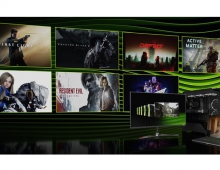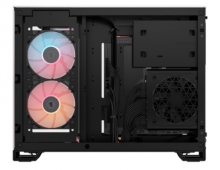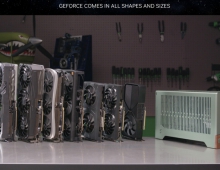
GeForce RTX 4080 GPU Launches, Unlocking 1.6x Performance for Creators This Week ‘In the NVIDIA Studio’
Content creators can now pick up the GeForce RTX 4080 GPU, available from top add-in card providers including ASUS, Colorful, Gainward, Galaxy, GIGABYTE, INNO3D, MSI, Palit, PNY and ZOTAC, as well as from system integrators and builders worldwide.
Talented filmmaker Casey Faris and his team at Release the Hounds! Studio step In the NVIDIA Studio this week to share their short, sci-fi-inspired film, Tuesday on Earth.
In addition, the November Studio Driver is ready for download to enhance existing creative app features, reduce repetitive tasks and speed up creative ones.
Plus, the NVIDIA Studio #WinterArtChallenge is underway — check out some featured artists at the end of this post.
Beyond Fast — GeForce RTX 4080 GPU Now Available
The new GeForce RTX 4080 GPU brings a massive boost in performance of up to 1.6x compared to the GeForce RTX 3080 Ti GPU, thanks to third-generation RT Cores, fourth-generation Tensor Cores, eighth-generation dual AV1 encoders and 16GB memory — plenty to edit up to 12K RAW video files or large 3D scenes.
3D artists can now work with accurate and realistic lighting, physics and materials while creating 3D scenes — all in real time, without proxies. DLSS 3, now available in the NVIDIA Omniverse beta, uses RTX Tensor Cores and the new Optical Flow Accelerator to generate additional frames and dramatically increase frames per second (FPS). This improves smoothness in the viewport. Unity and Unreal Engine 5 will soon release updated versions with DLSS 3.
Video and livestreaming creative workflows are also accelerated by the new AV1 encoder, with 40% increased encoding efficiency, unlocking higher resolutions and crisper image quality. AV1 is integrated in OBS Studio, DaVinci Resolve and Adobe Premiere Pro, the latter through the Voukoder plug-in.
The new dual encoders capture up to 8K resolution at 60 FPS in real time via GeForce Experience and OBS Studio, and cut video export times nearly in half. Popular video-editing apps have released updates to enable this setting, including Adobe Premiere Pro (via the popular Voukoder plug-in) and Jianying Pro — China’s top video-editing app. Blackmagic Design’s DaVinci Resolve and MAGIX Vegas Pro also added dual-encoder support this week.
State-of-the-art AI technology — including AI image generators and new editing tools in DaVinci Resolve and Adobe apps like Photoshop and Premiere Pro — is taking creators to the next level. It allows them to brainstorm concepts quickly, helps them easily apply advanced effects, and removes their tedious, repetitive tasks. Fourth-gen Tensor Cores found on GeForce RTX 40 Series GPUs help speed all of these AI tools, delivering up to a 2x increase in performance over the previous generation.
Expand creative possibilities and pick up the GeForce RTX 4080 GPU today. Check out this product finder for retail availability and visit GeForce.com for further information.
Another Tuesday on Earth
Filmmaker Casey Faris and the team at Release the Hounds! Studio love science fiction. Their short film Tuesday on Earth is an homage to their favorite childhood sci-fi flicks, including E.T. the Extra-Terrestrial, Men in Black and Critters.
It was challenging to “create something that felt epic, but wasn’t way too big of a story to fit in a couple of minutes,” Faris said.
Preproduction was mostly done with rough sketches on an iPad using the popular digital-illustration app Procreate. Next, the team filmed all the sequences. “We spent many hours out in the forest getting eaten by mosquitos, lots of time locked in a tiny bathroom and way too many lunch breaks at the secondhand store buying spaceship parts,” joked Faris.
Are you seeing what we’re seeing? Motion blur effects applied faster with RTX GPU acceleration.All 4K footage was copied to Blackmagic Design’s DaVinci Resolve 18 through the Hedge app that runs checksums, ensuring the video files are properly transferred and quickly generating backup footage.
“NVIDIA is the obvious choice if you talk to any creative professional. It’s never a question whether we get an NVIDIA GPU — just which one we get.” — filmmaker Casey Faris
Faris specializes in DaVinci Resolve because of its versatility. “We can do just about anything in one app, on one timeline,” he said. “This makes it really easy to iterate on our comps, re-edits and sound-mixing adjustments — all of it’s no big deal as it’s all living together.”
DaVinci Resolve is powerful, professional-grade software that relies heavily on GPU acceleration to get the job done. Faris’ GeForce RTX 3070-powered system was up to the task.
His RTX GPU afforded NVIDIA Studio benefits within DaVinci Resolve software. The RTX-accelerated hardware encoder and decoder sped up video transcoding, enabling Faris to edit faster.
Footage adjustments and movement within the timeline was seamless, with virtually no slowdown, resulting in more efficient video-bay sessions.
Even color grading was sped up due to his RTX GPU, he said.
Color grade faster with NVIDIA and GeForce RTX GPUs in DaVinci Resolve.AI-powered features accelerated by Faris’ GeForce RTX GPU played a critical role.
The Detect Scene Cuts feature, optimized by RTX GPUs, quickly detected tag cuts in video files, eliminating painstakingly long scrubbing sessions just to make manual edits, a boon for Faris’ efficiency.
To add special effects, Faris worked within the RTX GPU-accelerated Fusion page in DaVinci Resolve, a note-based workflow with hundreds of 2D and 3D tools for creating true Hollywood-caliber effects. Blockbusters like The Hunger Games and Marvel’s The Avengers were made in Fusion.
Faris used Object Mask Tracking, powered by the DaVinci Neural Engine, to intuitively isolate subjects, all with simple paint strokes. This made it much easier to mask the male hero and apply that vibrant purple hue in the background. With the new GeForce RTX 40 Series GPUs, this feature is 70% faster than with the previous generation.
“Automatic Depth Map” powered by AI in DaVinci Resolve.In addition, Faris used the Automatic Depth Map AI feature to instantly generate a 3D depth matte of a scene, quickly grading the foreground from the background. Then, he changed the mood of the home-arrival scene by adding environmental fog effects. Various scenes mimicked the characteristics of different high-quality lenses by adding blur or depth of field to further enhance shots.
3D animations in Blender.Even when moving to Blender Cycles for the computer-generated imagery, RTX-accelerated OptiX ray tracing in the viewport enabled Faris to craft 3D assets with smooth, interactive movement in photorealistic detail.
Faris is thankful to be able to share these adventures with the world. “It’s cool to teach people to be creative and make their own awesome stuff,” he added. “That’s what I like the most. We can make something cool, but it’s even better if it inspires others.”





















